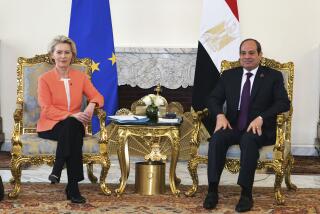12 W. European Nations Endorse Historic Accord
- Share via
MAASTRICHT, Netherlands — Leaders of 12 Western European nations reached a historic agreement Tuesday to link their political as well as economic destinies, but Britain elected to let the other 11 go their own way on worker rights and a common European currency.
Concluding two arduous days of negotiations, British Prime Minister John Major joined the heads of Germany, France and the nine other members of the European Community in approving procedures for developing joint foreign and defense policies.
The 12 leaders, seeking one day to rival the United States as a diplomatic actor on the world stage, took steps toward establishing what Dutch Foreign Minister Hans van den Broek called “our own defense identity.”
But their new foreign policy-making procedures differed little from what the EC’s own top bureaucrat, President Jacques Delors, had called “organized schizophrenia.” Delors declined to change that assessment Tuesday.
Eleven of the EC members, with Britain isolated in opposition, adopted broad guarantees of worker rights. Britain also was granted the right to be unbound by the 1999 deadline, accepted Monday, for replacing at least some of their national monies with a common European currency.
“It’s a decisive breakthrough that’s been achieved,” hailed German Chancellor Helmut Kohl. “I’m convinced the conference is a success.”
French President Francois Mitterrand, principal author of the procedures for establishing a common European currency, echoed that view, saying, “We can consider that this is a considerable step toward a more united Europe . . . .”
Major, defending his steadfast opposition to a workers’ rights charter, claimed that such a liberal package of benefits would reduce the competitiveness of all EC countries, including Britain. He rejected accusations that his opposition was fundamentally anti-worker. “Costing British workers jobs is not good for British workers,” he told reporters at a concluding news conference.
Britain came in for considerable criticism from its 11 partners.
“Without the British, we succeeded . . . ,” said Belgian Foreign Minister Mark Eyskens. “I think Great Britain is a part of Europe. They are not totally aware of that, but we are.”
Britain’s decision to keep its distance from the new Europe could not obscure the sweeping nature of the accords uniting the other 11. Never before, diplomats here said, had sovereign nations voluntarily yielded so much power to a supranational authority.
The accord reached by the 12 EC nations:
* Set out a formula to accept new member states into the community, with negotiations beginning as early as next summer on applications by Austria and Sweden, two of Europe’s richest non-member states.
* Gave some new powers to the European Parliament, the only democratically elected body in the EC apparatus. Even Dutch Prime Minister Ruud Lubbers, who chaired the two-day summit in this quaint, medieval Dutch town, predicted that the Parliament, now largely a debating society, would find the agreement inadequate.
* Established new procedures for admitting immigrants and asylum seekers to the 12 EC countries after national border controls come down after 1992.
* Set up a fund to assist the EC’s poorer members: Spain, Portugal, Greece and Ireland. “Spain is satisfied,” said spokesman Miguel Gil, whose country had threatened to veto any summit agreement that failed to provide it with financial benefits.
Britain joined the other 11 nations in achieving far-reaching, if cumbersome, procedures for Europe to establish joint policies on such critical foreign policy issues as the breakup of the Soviet Union and Yugoslavia. The agreement provides that the EC can make some foreign policy decisions by majority vote, instead of by unanimity, as is now required. But the 12 nations must agree on the areas in which majority voting will be allowed.
The accord on defense policy could turn the Western European Union, a mostly dormant body representing nine of the 12 EC nations, into the EC’s defense arm.
Despite the potentially far-reaching ramifications of the EC’s nascent procedures to set common foreign and defense policies, it was the politically sensitive issue of working conditions that dominated the final day of negotiations.
Piet Dankert, the Dutch state secretary for European affairs, said after the morning session that working conditions had dominated “a long discussion which did not lead to a result. . . . There exists no room for a compromise.”
The debated pitted the British, whose Conservative governments of the last decade have sharply cut back the power of trade unions to set working conditions, against many of the Continent’s social democracies.
The British, fearful that continental Europe would try to export its approach to the island, insisted that the EC should not obtain any authority in this field. France, taking the lead on behalf of several other EC members, argued equally vocally that worker rights constituted a fundamental pillar of their societies. Each side sought to impose its view on the other. A senior British official, asking not to be named, said the Continent’s approach led to industrial inefficiency and inhibited productivity.
“We think that damages Europe,” the British official said. “If we reduce the economic competitiveness of the (European) Community vis-a-vis the United States and Japan, that raises European unemployment.”
In the end, the 12 nations minus Britain agreed to a set of rules to limit work weeks and guarantee that workers be consulted about layoffs and plant closings.
Times staff writers Tyler Marshall and William Tuohy and researcher Isabelle Maelcamp contributed to this report.
More to Read
Sign up for Essential California
The most important California stories and recommendations in your inbox every morning.
You may occasionally receive promotional content from the Los Angeles Times.










